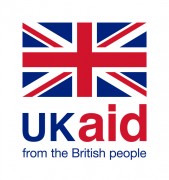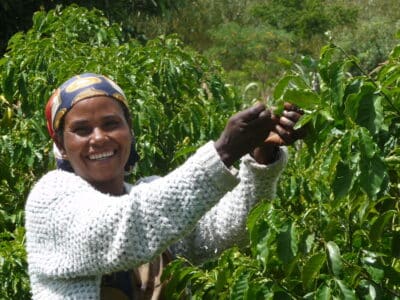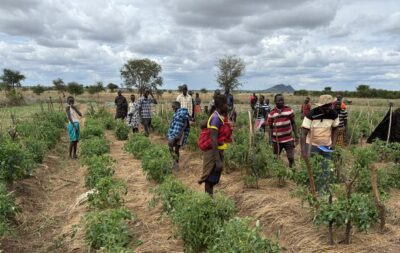News
9 February 2021
Women in coffee: working towards gender equality in Kanungu

Photos: Farm Africa / Jjumba Martin
“Traditionally, the coffee was for a man and for us women we were not benefitting anything from that coffee,” 23-year-old mother Hildah Turyamusiima.
Hildah, a coffee farmer from Kanungu, has begun to reap the rewards of her hard work thanks to Farm Africa’s work tackling gender bias within the Kanungu district’s coffee industry.
A new survey on women’s economic empowerment in agriculture (WEEIA) launched by the charity showed that women have more control over coffee production within the district. Of the 348 female coffee farmers interviewed, 89% claimed to actively input into decision making on agricultural production compared to only 22% in 2019.
This is a needed change within the industry as a recent report by Farm Africa confirmed that although women are the backbone of the area’s coffee industry, which fuels the local economy, it tends to be men who have control over the profits.
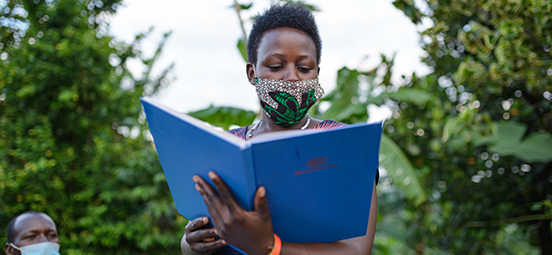
The report, Gender and the Coffee Value Chain in Kanungu, Uganda, found that although women contribute 58 per cent of the labour during the fieldwork and harvest stage of coffee production, and 72 per cent of the labour during post-harvest handling, women are unable to make a sufficient living through coffee farming.
Although women undertake the majority of the work involved in growing, harvesting and drying the coffee, men have a near monopoly over the mechanised processing and marketing activities. Men’s dominance over this segment of the value chain puts them in a position where it is they who make the final sale and receive the payment, often excluding women from participating in financial decisions.
This is further enforced by the lack of access to land, coffee trees, finance and representation in coffee cooperatives for women. Cooperatives help farmers to sell their coffee to lucrative markets, and provide supplies and services for coffee production.
Jennifer Kiconco, a coffee farmer in Kanungu, commented: “The most common challenge facing women is that men don’t contribute to farm work.”

Farm Africa, with funding from UK aid from the UK government, launched a project in September 2019 to close the gender gap in the coffee industry in Kanungu. The project works with coffee cooperatives, coffee farmers and local bodies to provide women with greater autonomy at the household, farm and cooperative level.
The project has helped women save and invest in their businesses by providing women with access to financial resources through Village Savings and Loan Associations (VSLAs), a group where women are able to save together and share financial resources, and by linking female coffee producers to financial institutions.
Farm Africa has also introduced voluntary household land-use agreements. Often daughters in Kanungu receive markedly less land than sons, or are totally excluded from land agreements. The project team has been working with families to ensure women have control over a designated portion of land to grow their coffee on.
Alongside providing women with resources to take control and grow their coffee businesses, the project is also focused on changing attitudes and unpicking myths surrounding women’s value and contributions to the industry through Gender Action Learning System Approach (GALS). This approach brings women and male decision-makers together to explore the economic and social benefits of women’s empowerment, spotlighting the benefits households stand to gain by providing women with access to, and control over the proceeds from, economic activities.
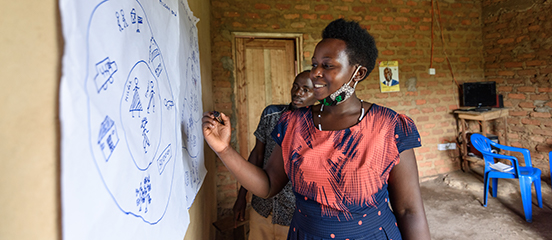
Hildah Turyamusiima has seen a positive change since participating in the project, establishing a land use agreement with her husband and becoming a trainer on GALS so that other women within her community can also have more say over coffee production and household expenditure.
“Farm Africa has trained us on GALS where there is a vision journey and a soul mate vision… my goal is to buy a car and build a family house with my husband with the savings from our coffee sales.”
Farm Africa’s WEEIA survey, which was conducted in November 2020, confirmed the success of the project so far, it found that alongside an increase in decision making, female coffee farmers are benefitting from having more control over household income, access to leadership roles within their coffee groups and cooperatives, and greater access to land.
“When female farmers prosper, the benefits are felt by all: the hard-working women themselves, the children who they invest in and the economies that they drive,” commented Rachel Beckett, Farm Africa’s Country Director in Uganda.
